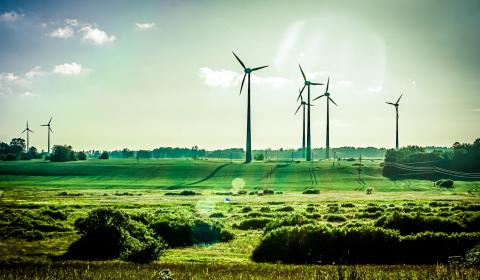
La transition vers les énergies renouvelables en Afrique
La transition énergétique désigne le passage, dans le secteur mondial de l'énergie, de systèmes de production et de consommation d'énergie d'origine fossile, notamment le pétrole, le gaz naturel et le charbon, à des sources d'énergie renouvelables comme l'énergie éolienne et solaire, ainsi qu'à des batteries lithium-ion. La pénétration croissante des énergies renouvelables dans le bouquet énergétique, le début de l'électrification et les améliorations du stockage de l'énergie sont autant de facteurs clés de la transition énergétique.
The global energy transition is well underway. Across the globe, government policy, regulation and commitment to decarbonization is varied. However, energy transition continues to increasingly become a business imperative for company leaders and an important consideration for investors who are prioritizing environmental, social and governance (ESG) factors. As more investors and companies seek greater clarity and confidence in accounting for long-term climate risks and opportunities, businesses are adapting to the energy transition.
Energy transition refers to the global energy sector’s shift from fossil-based systems of energy production and consumption, including oil, natural gas and coal, to renewable energy sources like wind and solar, as well as lithium-ion batteries. The increasing penetration of renewable energy into the energy supply mix, the onset of electrification and improvements in energy storage are all key drivers of the energy transition.
After years of depending on regulation for growth in the sector, renewable energy sources have become a powerful and cost-effective source of electricity. The costs of both solar and wind have fallen so drastically that in some regions of the U.S., as well as in the U.K. and Europe, wind power has become cheaper than traditional high-carbon energy resources. As costs continue to fall and wind and solar become mainstream, the renewable energy sector will only keep growing and solidify as a strong investment opportunity.
Global Forecast
The International Energy Agency (IEA) forecasts the world’s total renewable-based power capacity to increase 50% between 2019 and 2024. In response to this shift, utilities have begun a rapid energy transition away from coal. While some market observers expect that transition to slow, pressure is mounting on power generators to retire existing assets that depend on coal supplies and build out other forms of power generation. Many major oil companies are accelerating spending on and diversifying into renewable and low carbon energy in response to growing concerns over climate change.
A renewables-based energy transition promises to deliver vast socio-economic benefits to countries across Africa, improving energy access, creating jobs and boosting energy security. To realise these benefits, African countries have an opportunity to leapfrog fossil fuel technologies to a more sustainable, climate-friendly power strategy aligned with the Paris Agreement and low-carbon growth.
The Renewable Energy Transition in Africa Report, jointly prepared by Germany's KfW Development Bank, Deutsche Gesellschaft für Internationale Zusammenarbeit (GIZ), and the International Renewable Energy Agency (IRENA) on behalf of the German Federal Ministry for Economic Cooperation and Development (BMZ), explores how African countries can achieve universal energy access within the 2030 Agenda timeframe and identifies four areas of action:
- Promote access to energy;
- De-risk and promoting private sector investments;
- Strengthen and modernise the grid;
- Support systemic innovation.
The study also explores the transformational potential of the electricity sector in five African countries: Ghana, Ivory Coast, Morocco, Rwanda and South Africa. Specifically developed by the International Renewable Energy Agency (IRENA), country case studies show the real-life applicability of power sector transformation and demonstrates how countries can:
- Take advantage of the abundancy and competitiveness of renewables;
- Align ambitious renewable targets in energy and climate plans;
- Continue supporting the development of regional markets;
- Leverage renewables and distributed energy resources to achieve universal energy access;
- Develop tailored power sector transformation plans based on a systemic innovation approach;
- Build on policy frameworks for just and inclusive transitions.
Bureau Veritas’ Support for Global Energy Transition
As the renewable energy transition continues to expand and the power industry moves rapidly toward a low-carbon future, global testing, inspection and certification (TIC) giant, Bureau Veritas (BV) is well poised to support the movement. Building on over a century of history in the power sector, BV now boasts over 25 years of wind and solar expertise as well. Across all continents, BV has been involved in more than 3,000 onshore wind and solar projects in over 50 countries. Additionally, we have worked on more than 50 offshore wind projects, among them major industry flagship ventures. Bureau Veritas is poised to assist companies in their drive for Nett Zero carbon footprint.
Bureau Veritas offers a range of solutions that tackle immediate and future challenges around renewable energy development and operation. These include services in:
- Offshore Wind
- Onshore Wind
- Photovoltaic solar
- Hydro-electric